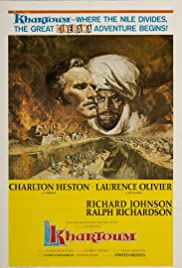
KHARTOUM
UK, 1966, 127 minutes, Colour.
Charlton Heston, Laurence Olivier, Ralph Richardson, Richard Johnson. Michael Hordern, Nigel Green.
Directed by Basil Dearden.
Khartoum was an intelligent historical spectacle filmed in Cinerama and impressive in that medium. Khartoum (like Young Winston) takes us back into the world of Victorian Empire and its politics, and an unpleasant look behind the scenes. But what is important in this film is the clash of personalities between the Mahdi and General Gordon and the way their clash was acted out in the history of the Sudan. Charlton Heston and Laurence Olivier act very well. Olivier does another of his excellent character roles and invests the Mahdi with some of the compelling force he must have had.
1. Was this film meant to be an action spectacle? Did it intend to say something about the nineteenth century, Britain and Africa? If so, what were the central themes of the film?
2. Did the narration give sufficient background for understanding the issues involved, especially the defeat of the British under Hicks? Why were they so soundly beaten? Why did they not understand the desert and the Mahdi?
3. The Mahdi, his beliefs and his belief in himself? Was he genuine, politically cunning or both? How did he get his people behind him? How did Laurence Olivier's performance add to the impact and presence of the Mahdi?
4. What picture of British politics did the film give - how realistic. how cynical? Is face-saving policy always essential? Does this presentation of politicians gain them any respect? What alternatives did Gladstone have? Was sufficient regard taken of persons and of countries considered inferior to Britain? Why?
5. What was your impression of Chinese Gordon before we saw him? What kind of man was he? How do you explain his beliefs. and belief in himself? How genuine, how politically cunning? How religious? His sense of destiny? How did the film parallel him with the Mahdi? Were they equal opponents?
6. Why did Gordon accept the task? What did he hope to achieve for the people of Khartoum, for himself? Why did he believe he could do it? Did the set-back in his Egyptian negotiations deter him? Why not? What did the British government expect of the expedition? what did they pledge? why were they prepared to dump Gordon if necessary?
7. What role did Stewart play in the film - in the action, a British officer, as adviser to the Government. as adviser to Gordon? What was his opinion of Gordon based on? What did he expect of Gordon?
8. How did the voyage up the Nile to Khartoum visually present the tenseness of the situation, the risks and danger? What kind of fear did the Mahdi inspire - in foreigners, the British, the chieftains who had opted against the Mahdi? Why did Gordon have to be so strict in governing Khartoum - the pressures of the chieftains, the rationing and executions for stealing (even of close associates)?
9. Why did Gordon stay in Khartoum after Stewart's unsuccessful trip to England? What did he think the government was doing? Did he see all the alternatives? Was the evacuation by boat a good plan? How well was this voyage filmed - the going past forts and the final pursuit by the boats?
10. The encounters between Gordon and the Mahdi. What did they add to the film? How did they reveal each other's characters and sense of destiny? Did they understand each other? How menacing was the second visit - Gordon's daring in going, the Mahdi's showing of the head and Stewart's hand? Did Gordon realise then that all was finished?
11. What was the impact of the British commander's staying in Egypt and refusing to move? Why?
12. Did Gordon do his best in preparing Khartoum for siege? Was his death surprising? What impact did it have on the people? Was he admired in death? The significance of the epilogue - praise of Gordon, the death of the Mahdi, the seeming insignificance of momentous events years later?